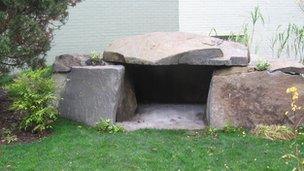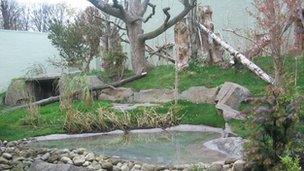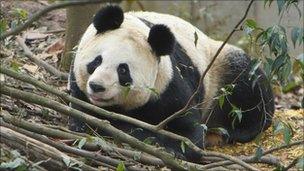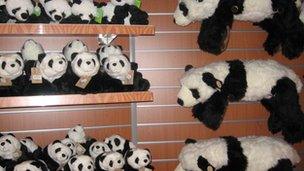Edinburgh Zoo pandas to arrive from China on Sunday
- Published
Chinese pandas Tian Tian and Yang Guan are due to arrive in Edinburgh in early December
Two giant pandas are due to arrive in Edinburgh on Sunday, officials have announced.
Tian Tian and Yang Guang will make the journey from China in perspex cages on board a special chartered flight.
They will be the first pandas to live in the UK for 17 years.
The pandas, who will live in separate enclosures, will be given about two weeks to become accustomed to their new environment before they go on display to the public.
Pandas are solitary animals which only come together to mate.
The male panda, Yang Guang, will live in "panda west" and the female, Tian Tian, in "panda south".
Two giant pandas from China will arrive in Edinburgh Zoo on Sunday
BBC Scotland has been given exclusive access to the £250,000 enclosures, which each contain a water feature, cave and climbing structures made from tree trunks.
Hugh Roberts, chief executive of Edinburgh Zoo, said: "We have been looking forward to this moment for five years now, since we first embarked on this epic journey to bring the giant pandas to Scotland.
"The arrival of Tian Tian and Yang Guang is an historic occasion for the zoo, for Scotland, and for the UK as a whole.
"Our dedicated team at the zoo has worked tirelessly to create a world-class enclosure to house our newest additions which will offer visitors a once-in-a-lifetime opportunity to view these extraordinary animals.
"The giant pandas will be on loan to us for an initial period of 10 years, in which time we are hopeful that the female, Tian Tian, will give birth to cubs - the first to be born in Scotland."
First Minister Alex Salmond said: "I will be in China myself on the day they arrive signing a cultural exchange agreement with the Chinese and I am sure all Scotland will be delighted to welcome Tian Tian and Yang Guang with the warmest of Scottish receptions awaiting them.
"Having the pandas at Edinburgh Zoo is a considerable honour and will be a huge draw for visitors and will give a welcome boost to the economy and to tourism.

Each enclosure has a small cave for the pandas to shelter in if they are outside
"Securing the loan of the pandas symbolises the great and growing friendship between Scotland and China and testament to the Royal Zoological Society of Scotland's world-class reputation for research, science and conservation."
Liu Xiaoming, the Chinese ambassador to the UK, said: "Tian Tian and Yang Guang's arrival in the UK is part of a 10-year joint research programme to find out how human-bred pandas can survive in the wild.
"At its core, the project represents the growing scientific ties between China and Britain.
"But this is about much more than conservation.
"It is also about science, culture, education and above all friendship and partnership.
"Through these themes we expect pandas to bring China and Britain even closer together."
FedEx Express has donated its services for the transport of the giant pandas from China to Scotland.
The pandas will travel onboard a Boeing 777 Freighter.
The aircraft's long-range capability will allow the pandas to fly non-stop to their new home in Edinburgh, ensuring that they will spend the minimum possible amount of time in the air.
The keeper who will be in charge of their health and welfare, Alison Maclean, recently spent almost three weeks at the Woolong National Nature Reserve in Sichuan Province getting to know the animals.
She will be the main contact between Edinburgh Zoo and the panda experts in China.

Each enclosure has a water feature and climbing structures made out of tree trunks
There is a fenced hole between the two enclosures where the pandas will be able to see and smell each other. It will be removed if and when the pandas are in season to mate.
If they settle in well, it is hoped they may be ready to try to breed early next year.
Ms Maclean said: "It's extremely important both indoors and outdoors that they have the opportunity to see one another, and also get close but not get in beside one another.
"It helps build up a relationship between them. It makes it much easier for us to identify if the female looks as if she's starting to come into season."
She will be reporting back on the behaviour of Tian Tian in order to establish when she is in season, and will conduct blood tests and take swabs in the spring.
Ms Maclean told BBC Scotland: "The female is only going to be in season for a very short period of time, and receptive to the male for even shorter.
"So you're maybe only looking at a day and a half to two days out of a year."
Earlier this month, she told the BBC Scotland news website that it was a "huge privilege" to be looking after the pandas.
"I am excited, but it is tempered with trepidation to be in charge of one of the most iconic species on the planet," she said.
The pandas are now trained to come to their indoor cage when they are called by Ms Maclean.

Female Giant Panda Tian Tian in her enclosure at the Bifengxia Panda Centre
Although their diet consists almost exclusively of bamboo, they do eat rats, mice, pikas (rabbit-like creatures) and eggs.
However, Ms Maclean said they would be fed panda cake, which contains steamed protein and other nutrients instead of carrion or eggs.
She said the enclosure was slightly smaller than the one in China - but that when it came to pandas, it was about the quality of climbing structures and water features rather than the physical size.
Gardeners were given £25,000 to landscape the inside of the enclosures.
Simon Jones, Edinburgh Zoo's garden manager, said they were given a list of specifications.
He said: "We had to make sure the trees and shrubs were non-toxic to pandas.
"We also had to make sure the water feature wasn't too deep for any future panda cubs.

All the panda merchandise is already on display in the Edinburgh Zoo gift shop
"The male is more active and the female more fussy, so we took that all into consideration."
Bamboo has been planted in another part of the zoo, while there are Chinese plants inside the enclosures.
A spokesman for animal protection charity Onekind said it would be interesting to see the public's reaction to viewing the pandas in a confined space.
He said: "Seeing them inside the cages may make them question whether it is right to keep animals in small spaces instead of being in the wild, and if that is how they want their children to see them.
"The pandas are seen as a money spinner rather than a conservation exercise.
"If they have cubs they will never be able to be freed into the wild so they will also be captive for the rest of their lives."
Born in 2003, Tian Tian (meaning "sweetie") and Yang Guang (meaning "sunshine") will be under custodianship of the Royal Zoological Society of Scotland (RZSS).
- Published10 November 2011
- Published8 August 2011
- Published20 July 2011
- Published8 July 2011
- Published6 June 2011
- Published29 May 2011
- Published5 May 2011